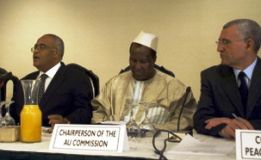African Union may have to impose Darfur solution – Chad
Feb 16, 2006 (NDJAMENA) — The African Union may have to impose a peace settlement between Sudan’s government and Darfur rebels if the two sides take too long to reach an agreement in ongoing peace negotiations, Chad’s foreign affairs minister said.
 Those involved in the three-year-old conflict in Sudan’s western region of Darfur have had enough time to present and discuss their positions on various issues and the world is tired of waiting for the conflict’s resolution, Foreign Affairs Minister Ahmad Allam-mi told The Associated Press Thursday.
Those involved in the three-year-old conflict in Sudan’s western region of Darfur have had enough time to present and discuss their positions on various issues and the world is tired of waiting for the conflict’s resolution, Foreign Affairs Minister Ahmad Allam-mi told The Associated Press Thursday.
“We (the mediators, Chad and African Union) can propose a solution. If the parties do not accept it then, with the backing of the United Nations, the African Union can impose peace,” said Allam-mi.
On-again, off-again talks to resolve the Darfur conflict, which has claimed tens of thousands of civilian lives have been going on since early 2004. They have taken place in the Chadian capital, N’djamena; at the African Union headquarters in the Ethiopian capital, Addis Ababa; and are now in the Nigerian capital, Abuja.
Chad and the African Union have been co-mediators. For a month or so in 2005, however, Chad temporarily withdrew because of attacks in the country’s east, which it said were instigated by neighboring Sudan.
Allam-mi has been involved in peace negotiations throughout that time, first as the diplomatic adviser to President Idriss Deby, who led the first Darfur cease-fire negotiations, and then as foreign affairs minister when he was appointed to the post late last year.
“It is time for the mediators to become doctors. It is not the patient who prescribes a cure. That is for the doctor to decide,” Allam-mi said.
He did not say whether he had discussed such a possibility with the African Union’s envoy to the Darfur talks, Salim Ahmed Salim, nor did he specify a time frame for when mediators should intervene and impose a solution.
In Darfur, an estimated 180,000 people have died, mainly of hunger and disease, and about 2 million have been displaced since the conflict started when rebels from the region’s ethnic African population revolted, accusing the Arab-dominated government in Sudan’s capital, Khartoum, of discrimination and decades of neglect.
The government is widely alleged to have used Arab militias, called Janjaweed, as a counterinsurgency strategy. The Janjaweed are accused of carrying out sweeping atrocities against ethnic African villagers. The government denies it supports the Janjaweed.
In recent months, it looked like Chad would not only host about 300,000 Darfur refugees and help mediate peace negotiations, but also be drawn into the conflict. A number of Chadian rebel groups have been formed in the area bordering Darfur and they have been joined since September by scores of mutineers from the army.
The army fought back two main groups that tried to take the eastern Chad town of Adre in December. About 300 rebels were killed, according to the army. From the time of that attack, tension between Chad and Sudan rose, each accusing the other of backing the rebel groups, and Chad saying it was in a state of war.
On Feb. 8, however, both countries’ presidents signed in the Libyan capital, Tripoli, an accord on steps to reduce border tensions.
At the Tripoli meeting, both countries agreed to have troops patrol the 1,000-kilometer (625-mile) Chad-Sudan border as a measure to reduce tensions, “because it (the border) is a zone where many people operate,” Allam-mi said. “There is an enormous circulation of arms. It is difficult to control.”
He said that the details of the border patrol force — whether operated jointly by Sudan and Chad or troops from the African Union supplemented by Libyan troops — will be discussed at follow-up meetings such as one between intelligence officials from both countries within a week’s time in Tripoli.
The African Union’s Peace and Security Council is scheduled to meet on an unspecified date to authorize a team to go and study the situation at the border, he said.
(ST/AP)
